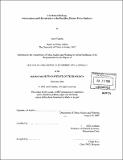The risk of reform : privatisation and liberalisation in the Brazilian electric power industry
Author(s)
Tankha, Sunil, Ph. D. Massachusetts Institute of Technology
DownloadFull printable version (13.14Mb)
Alternative title
Privatization and liberalization in the Brazilian electric power industry
Other Contributors
Massachusetts Institute of Technology. Dept. of Urban Studies and Planning.
Advisor
Alice Amsden.
Terms of use
Metadata
Show full item recordAbstract
In 1996, when Brazil was well-underway to privatising and liberalising its electric power industry, few would have predicted that within five years the reforms would be a shambles. Like its neighbors Argentina and Chile, Brazil based its electricity reforms on the orthodox therapies of privatisation and liberalisation. The industry was well-positioned to benefit from the reforms: it was technically sophisticated, relatively efficient, and attractive to both domestic and foreign investors. Electricity rates had been suppressed for a long time, but they were not populist and it was the residential customer who cross-subsidised industry. As such, political backlash to increasing electricity prices was unlikely and, in fact, Brazil had successfully begun to raise electricity rates as early as 1993. Despite these fortuitous circumstances, the reforms did not induce sufficient investment and Brazil suffered a massive electricity rationing in 2001. For ten months all classes of consumers had to cut consumption by 20%. By 2002, the electricity reforms were politically dead and none of the candidates in Brazil's presidential elections that year, not even the incumbent administration's nominee, favoured continuing with them. (cont.) My dissertation explains why the reforms failed, approaching the issue from three different perspectives-the policy, the economic and the industrial. Collectively, these essays explain why sectoral neoliberal reforms had a short shelf-life.
Description
Thesis (Ph. D.)--Massachusetts Institute of Technology, Dept. of Urban Studies and Planning, February 2006. Includes bibliographical references.
Date issued
2006Department
Massachusetts Institute of Technology. Department of Urban Studies and PlanningPublisher
Massachusetts Institute of Technology
Keywords
Urban Studies and Planning.